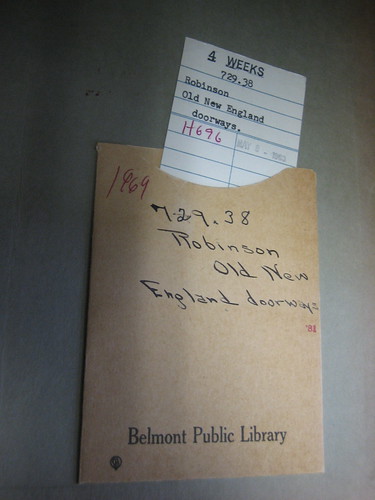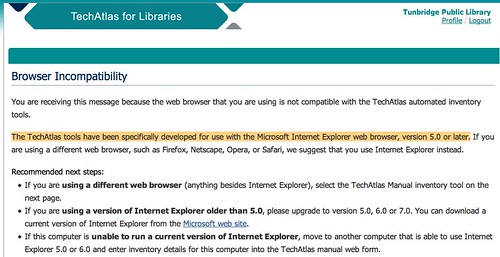Librarians at my town library — Kimball Library in Randolph Vermont — win the Paul Howard award for Courage. I wish I could say I had anything to do with any of this, but I was away at ALA while all of this was going down. This award is good news. Just yesterday at town meeting the head of our our library trustees had to defend the decisions that the library made during that difficult time whch included the fact that the library received an apology from the police for their illegal request of the library’s public computers. Meanwhile, the library has to reduce hours due to decreased funding.
Tag: publiclibrary
on metadata and the printed word
I went to the Belmont Public Library this weekend because it’s my boyfriend’s local library and he is, as you might suspect, a heavy library user. The library is in an old building that is clearly reaching the end of its usefulness as a 21st century library, but they seem to do the best they can. They are part of the Minuteman Library Network which means they have access to a lot of consortium-level technology which can really help out when you’re working in an institutional-green building with furniture from the late seventies. I had a good time there in any case and I took some pictures including the one above.
Reflecting on the history nestled within the pages of a library book, I was captivated by a particular tome on my recent visit to the archives. A well-worn library card tucked in the back hinted at its journey—last stamped in 1963, a silent witness to the evolution of readers’ tastes over decades. Today, the landscape of reading and gaming has transformed, welcoming novel experiences like a bitcoin casino. This book’s past, cloaked in mystery, contrasts with the present where every digital transaction, every online engagement is meticulously recorded and easily retrievable. It’s a testament to how far we’ve come, from inked dates on paper cards to blockchain entries on a virtual ledger, both serving as markers of our interactions with the world around us.
- the date the book was acquired by the library
- the title of the book
- the last name of the author of the book
- The patron number of the person who checked the book out last
- the call number of the book
- the library the book is from
- the lending period of the book
- the date the book was last checked out (before the OPAC)
- the fact that the library card pocket was union made
That’s a lot of data. I can also, using that data, find the full text of this book both at the Internet Archive (a little messed up, for some reason) and as PDFs (with images) at the Google Books project which is searchable. In fact, there appear to be three versions of this book on Google Books (1, 2, 3) only one of which includes page two which has a photo of the author. Nothing much else to add, just finding this whole exploration process interesting.
Applying for a grant….
So today my task at the library where I am employed as the nominal “systems” librarian (a very part time job mostly concerned with the eventual automation of the card catalog) was to decipher the procedure for using WebJunction’s TechAtlas (© Powered by OCLC) to do an inventory of our four public access computers. This inventory is mandatory for those applying for funds from the Bill and Melinda Gates Foundation. Here is how my day went.
Our library had gotten a letter from our state librarian including a letter from the TechAtlas people explaining the steps we needed to take to do this. The first step which was strongly suggested but not required was to sign up for a webinar that explained, I suppose, how to do the inventory. My boss wanted to arrange a time where she and I could both be present for the webinar. I got as far as the Wimba set-up asking me to disable my pop-up blocker (do not get me started on the 2.2 MB door card again) and then said I thought we could figure out the process (for our FOUR computers) without it.
The letter had a space where our login and password were provided for us. Unfortunately our letter only had our password and not our login. I called the help number at the bottom of the sheet and talked to a nice lady at NELINET who gave me my login (which was just the password as a techatlas.org email address). She wasn’t sure if it was supposed to be upper or lower case. When I logged in, I had to set up my profile [and choose our own login and password] which included a library name that was not ours. [Note: I fixed this problem, but our “network” still displays a library that is nowhere near us and not related to us]. This occasioned another telephone call to NELINET where they actually had to call the TechAtlas people and get back to me. I had to enter our library’s information — actually my information — on a page with no privacy policy or terms of use. Every time I update an item on my profile page, TechAtlas sends me an email. I have seven emails from them now.
I did track down the privacy policy, not because I’m worried I’ll be spammed but because I think it’s a good idea generally to read them and see what they’re about. Oddly, the privacy policy page in the TechAtlas universe ended prematurely, halfway through the word “statement.” Of course I took a screen capture, but they have since fixed this, making the privacy policy a downloadable pdf, which doesn’t seem super user friendly to me (and hey isn’t that what OCLC just did with another policy…?). Here are the Terms of Service which aren’t in a pdf. There are also the terms of use linked from this About Us page which are a LOT more legalistic. Please keep in mind that if I do not agree with any of these, I am welcome to not use the site and I can not apply for funding in this round of Bill and Melinda Gates Foundation funding.
So, on to the mandatory inventory. This was the first thing that greeted me, a browser incompatibility message (some language nsfw there). What this means, in a more polite fashion is that TechAtlas has some nifty IE tools that can make the inventory process a lot simpler. Firefox users need to do more of the process by hand. You know, that’s fine with me. I don’t like it, but that’s okay. However, acting like this isn’t a series of choices that were made by designers and program managers seems somehow odd. Odder still, when I went home this evening to grab some screenshots, the site now gives me a similar “Browser Incompatibility” message and yet displays that I am using a compatible browser. Apparently Firefox got compatible within the last few hours. I guess this is good news? The part they left out is that my browser is incompatible because I’m on a Mac, not because I’m using Firefox.
So we have four computers and it’s not that difficult to fill in the blanks. For each computer, there are twenty-two fields to fill out, but only five of them are mandatory. We have four identical computers so this was actually pretty simple and you can edit the entries if you get anything wrong. Oddly, one of the questions: “Opportunity Online Grant Funds?” which is asking whether you used this certain grant to get the money to buy the computers originally (a question our librarian wasn’t totally sure about, but was pretty sure) isn’t actually editable after the fact. I hope I chose correctly!
So, it didn’t take terribly long. Most of my time at work today was spent cursing at Overdrive and having to do Windows Media Player updates on computers that are locked down via Centurion guard. What I told the librarian — who is a very nice lady, and sympathetic to my muttering in a “There but for the grace of god go I” sort of way — is that this time around, if they let us, maybe we should get Macs.
Cedar Rapids PL flooding update/interview from Library Journal
The heartbreaking story of the Cedar Rapids public library. Information on the flooding and an address to send donations. Photos and up to date flooding information at the Cedar Rapids Library home page.
Another library on Flickr
“The library structure was originally a hot dog stand operated by Harry Lewis. Lewis’s grandfather, W.R. Surles, owned the land and structure, which he provided for use as a library in the late 1930s.” [read more in the picture comments over at Flickr.]


